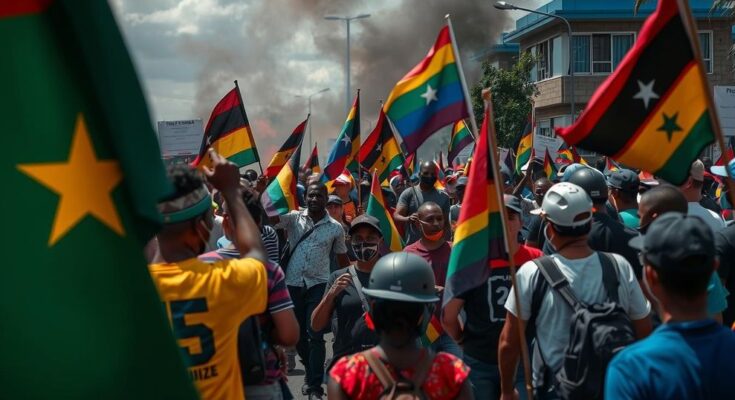Mozambique’s government has banned protests after weeks of violence following disputed elections. The ruling Frelimo party’s victory led to unrest, with more than 18 fatalities reported. The Interior Minister labeled the protests “acts of terrorism.” Concerns over human rights abuses and electoral fairness have emerged as tensions rise amidst government crackdowns on dissent.
The government of Mozambique has officially prohibited protests following several weeks of escalating violence in the wake of the recent presidential election. This decision comes after clashes between law enforcement and demonstrators, which have resulted in numerous fatalities and injuries. The elections, held last month, have been marred by allegations of fraud, with the ruling Frelimo party securing over 71% of the vote. Opposition leader Venâncio Mondlane, who garnered 20%, has reportedly gone into hiding due to safety concerns, especially after the assassination of his aide and lawyer. As protests intensified, the military was deployed to assist in maintaining order while authorities deemed such demonstrations as acts of terrorism. The Interior Minister, Pascoal Ronda, criticized the organizers of the protests and called for public compliance with authorities. Human Rights Watch has expressed concerns regarding the government’s restrictions on internet access, suggesting it is aimed at stifling dissent and limiting transparency. Overall, the public remains deeply divided on the transparency and fairness of the electoral process, particularly as President Filipe Nyusi approaches the end of his two-term mandate.
The political landscape in Mozambique has been dominated by the Frelimo party since the end of its civil war in 1975. The recent presidential elections have heightened tensions among citizens, as many view the elections as unfair, prompting large-scale protests in urban centers, particularly in the capital, Maputo. Human Rights groups have reported a concerning number of civilian casualties during the unrest, with accusations of governmental overreach and suppression of free speech becoming more prevalent. Given the upcoming transition of power with current President Nyusi stepping down, the political stability of Mozambique is of paramount concern.
In conclusion, Mozambique’s government has taken strict measures to quell unrest following a contested election outcome, marking a troubling shift towards increased repression of dissent. As protests unfold, with allegations of state violence and suppression, the future of democracy in Mozambique hangs in the balance, particularly as citizens question the integrity of their electoral system. The socioeconomic impact of such unrest is also significant, as ordinary citizens experience heightened instability and disruption in their daily lives.
Original Source: www.bbc.com




